Outcompeting Cancer
Tor Erik Rusten will utilize the fruit fly animal model system, Drosophila melanogaster, where genetically designed tumors can be stereotypically produced, to uncover the molecular mechanisms of cell competition that subsequently may be targeted for cancer management. Recent findings in animal models have uncovered that tumors are bestowed with the “superpower” to outcompete and kill neighboring normal cells in the microenvironment to allow proliferation and tumor expansion. Blocking this competitive ability stops tumor growth in animals - and importantly - human tumors grown in mice. Herein lies the proven potential to harvest the ability to interfere with cell competition to stall tumor growth and “outcompete cancer”. They will survey the cell biology and effects on transcription, metabolism, and proteome by microscopy and Omics technologies to learn about the reciprocal effects between tumors and immediate neighbors during competition. Any mechanisms identified in tumor-driven cell competition will not only expand the knowledge about the biology of cell competition, but expand the potential targets to block tumor progression in a treatment setting. Given the translatability of findings in tumor biology in general and cell competition in particular - from fly to mammals -, mechanisms uncovered are likely to be conserved and clinically relevant.
A Membrane Contact Site Pathway as Target for Cancer Therapy
Camilla Raiborg and her group have identified a novel mechanism where endosomes make contact with the ER to refuel microtubule motors for endosome transport to the cell membrane. Here the endosomes fuse with the cell membrane to form cellular protrusions. When this mechanism is hyper-activated, they find that it promotes cancer development in several ways; by facilitating anabolic mTORC1 signaling, cell migration and angiogenesis as well as cancer cell invasion through the formation of invasive protrusions. In tumours, high expression of Protrudin (the central molecule of this pathway) correlates with low survival in several cancer types.
The overall goal of this project is to understand the relationship between ER-Endosome contact-mediated endosome translocation and cancer development and progression. Finally, they will investigate the possibilities for targeting this pathway in cancer therapy.
Defective nuclear envelopes in cancer progression and response to therapy
In this project Marina Veitri aims to study the dynamics and effects of damaged nuclear envelopes in cells. In particular, she will focus on the membranes that surround micronuclei and chromosome bridges, aberrant extra-nuclear DNA structures that are frequently observed in tumors.
